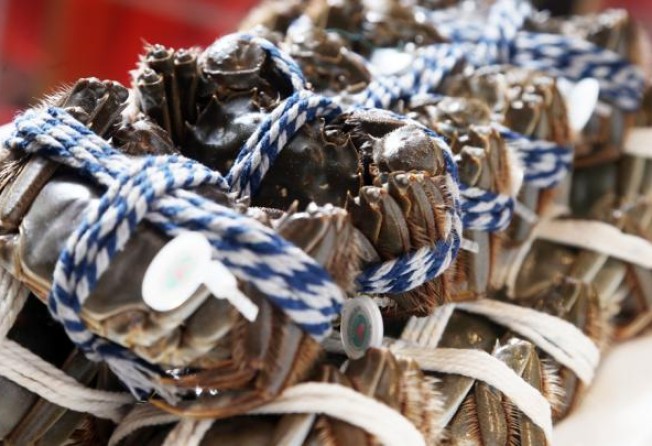Trade in fake Yangcheng Lake hairy crabs rampant
The Yangcheng Lake crab is a delicacy to savour, but that crustacean on your plate is probably fake

It's hairy crab season again, but most people tucking into the famed Yangcheng Lake variety will probably be eating high-priced fakes.
Traders admit that even crabs served in lakeside restaurants are unlikely to be genuine Yangcheng Lake hairy crabs - defined as those raised in the lake for at least six months - Shanghai's Oriental Morning Post reported.
Most of the crustaceans sold as Yangcheng Lake hairy crabs on the mainland are actually grown in other waters. Some are known as "bathing crabs" because they spend a short time - several hours to a couple of weeks - in the lake before being passed off as the genuine article.
Counterfeiting is rampant despite years of crackdowns by the local crab industry association and the authorities.
Total annual output from the lake, in the south of Jiangsu province, near Suzhou , is less than 3,000 tonnes, but booming demand from mainland cities, Hong Kong, Taiwan and Japan sees upwards of 100,000 tonnes of "Yangcheng" crabs sold each year. A surge in online sales over the past two years has exacerbated the problem.
Despite massive demand, the amount of fake product on the market means that prices for Yangcheng Lake hairy crabs have remained more or less the same for at least three years.
The Oriental Morning Post said most fake crabs come from lakes in Jiangsu's Xinghua city and Gaochun county, or small ponds near Yangcheng Lake. Farmers say real Yangcheng Lake hairy crabs taste so much fresher than the impostors that consumers do not need to worry about adding condiments when eating them.
While the genuine article is celebrated for its golden carapace, pure white belly shell and glistening roe, fakes are now being treated with "crab washing powder" to make their bellies turn white.
However, the most effective counterfeiting technique is the use of fake or falsely applied anti-counterfeit tags.
Since 2005, the Suzhou Crab Business Association has required each Yangcheng Lake hairy crab to be marked with a plastic ring attached to one of its claws bearing a unique 12-digit code. But the campaign has proved to be toothless.
The tag is usually distributed to local farmers when the crabs are harvested, but no one checks to see whether they actually attach them. Some farmers opt not to use the tags when dealing with regular customers who trust them and plan to eat the crabs immediately. Some sell the unused tags to other traders for about three yuan each.
One store in Yantai , Shandong province , was busted for selling fake Yangcheng Lake hairy crabs at the end of last month because the crabs had no tags and the store's owner was unable to produce any paperwork showing where they came from, the Qilu Evening News reported.
Without iron-fisted and effective actions against the fraudsters, it seems the future of the Yangcheng Lake hairy crab as a gastronomic treat looks rather bleak.